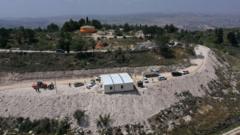Tensions are rising between the Trump administration and Israel as negotiations for a nuclear deal with Iran proceed. Prime Minister Netanyahu is advocating for military strikes on Iran’s nuclear sites, undermining the U.S.'s diplomatic efforts.
Trump Faces Pressure from Israel as Iran Deal Negotiations Intensify

Trump Faces Pressure from Israel as Iran Deal Negotiations Intensify
As President Trump seeks a diplomatic resolution with Iran, Israeli Prime Minister Netanyahu advocates military action against Iran's nuclear program, increasing tensions.
In the backdrop of diplomatic negotiations, President Trump is reportedly pursuing a nuclear agreement with Iran, hoping to limit the nation’s potential for nuclear weapon production. However, Israeli Prime Minister Benjamin Netanyahu is growing increasingly impatient and is openly pressing for military action against Iran’s main enrichment facilities, raising fears of a disruptive confrontation.
Recent interactions between administration officials and Israeli counterparts reflect a growing rift on how to best address and capitalize on what some perceive as Iran's weakened position. Reports indicate that Trump had discussions with Netanyahu recently as tensions escalated, revealing the difficulty in aligning the two countries' strategies concerning Iran.
In remarks on Sunday, Trump expressed optimism about the talks, suggesting "something good" could emerge soon. However, insiders caution that any developments may only provide a framework for more discussions rather than a complete solution. Critical points of contention include the potential for Iran to continue uranium enrichment and how to manage its stockpiles of near-weapons-grade fuel.
Earlier reports indicated that Israel had been on the verge of launching strikes against Iranian sites in April but was dissuaded by Trump, emphasizing his desire to pursue negotiations with Tehran. Netanyahu's continued insistence on military action without explicit U.S. support may complicate the administration's diplomatic strategy further.
This situation exemplifies the diverging paths that Israel and the United States may take, as both leaders grapple with threats posed by Iran’s nuclear capabilities and the efficacy of military versus diplomatic solutions in achieving their security objectives.
Recent interactions between administration officials and Israeli counterparts reflect a growing rift on how to best address and capitalize on what some perceive as Iran's weakened position. Reports indicate that Trump had discussions with Netanyahu recently as tensions escalated, revealing the difficulty in aligning the two countries' strategies concerning Iran.
In remarks on Sunday, Trump expressed optimism about the talks, suggesting "something good" could emerge soon. However, insiders caution that any developments may only provide a framework for more discussions rather than a complete solution. Critical points of contention include the potential for Iran to continue uranium enrichment and how to manage its stockpiles of near-weapons-grade fuel.
Earlier reports indicated that Israel had been on the verge of launching strikes against Iranian sites in April but was dissuaded by Trump, emphasizing his desire to pursue negotiations with Tehran. Netanyahu's continued insistence on military action without explicit U.S. support may complicate the administration's diplomatic strategy further.
This situation exemplifies the diverging paths that Israel and the United States may take, as both leaders grapple with threats posed by Iran’s nuclear capabilities and the efficacy of military versus diplomatic solutions in achieving their security objectives.




















